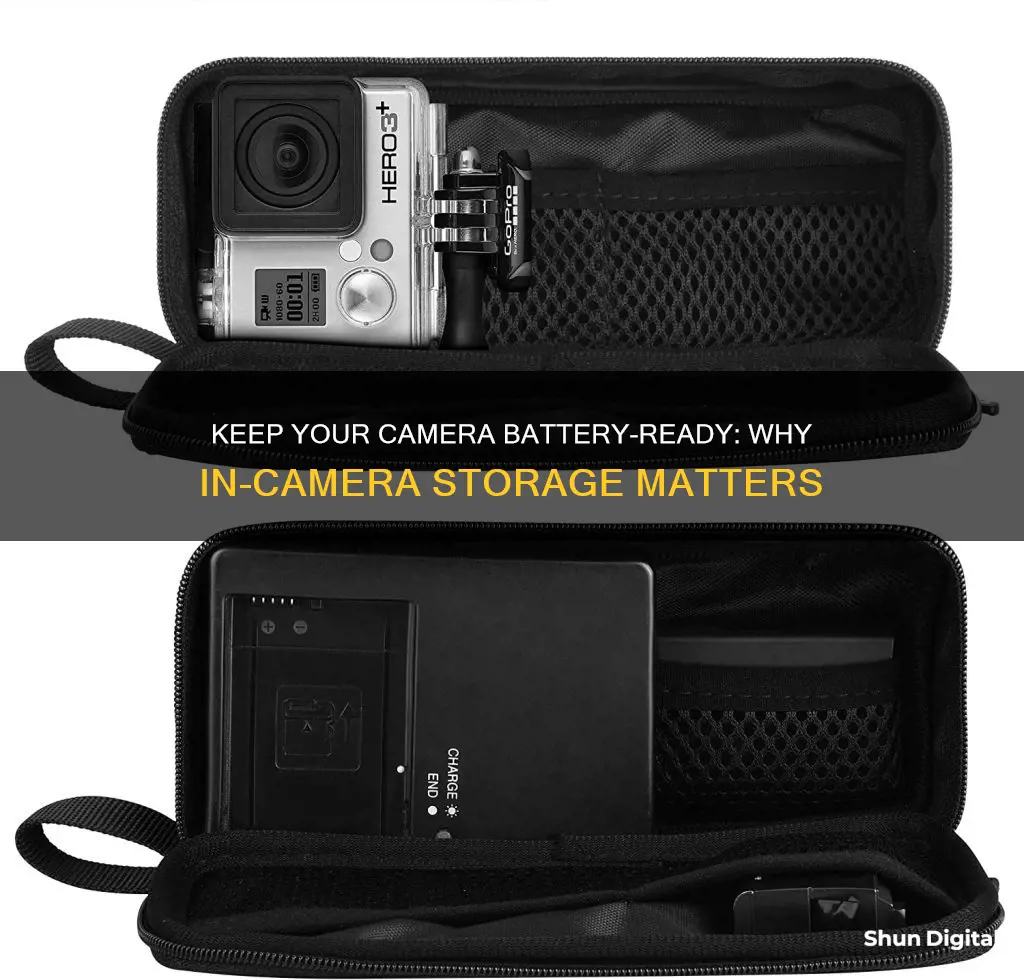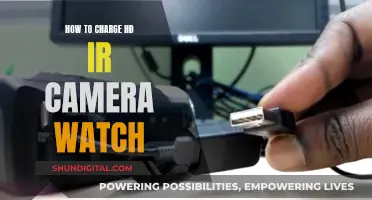
Whether or not to keep batteries inside a camera during periods of non-use is a highly debated topic among photographers. Some people suggest that it is completely fine to leave your camera's batteries in for an extended period of time, as long as the camera is completely turned off. On the other hand, some photographers recommend removing the batteries and storing them in a cool, dry place to prevent battery leakage and swelling, which could potentially damage the camera. Additionally, rechargeable batteries tend to lose power over time, even when not in use, so it is advisable to keep spare batteries charged and ready for use. Ultimately, the decision comes down to personal preference and how often you plan to use your camera.
What You'll Learn

Leaving batteries in can drain them
Leaving batteries in your camera can drain them, even when the camera is off. This is because some cameras have components that use a small percentage of battery power even when switched off.
Some cameras also have a monitoring circuit that continues to run when the battery is left inside, which can burn charge. In addition, the battery monitoring circuitry in some cameras can lead to excess discharge and shorter battery life.
If you leave your camera unused for a week or two, it will be fine to leave the batteries in. However, if you plan to leave your camera unused for six months to a year, you might want to take the batteries out.
If you do leave the batteries in your camera, make sure it is fully off and the battery is not flat. It is bad for lithium batteries to be left unused for long periods of time (more than a few days) with the battery discharged.
Polaroid 600 Camera: How Long Do Batteries Last?
You may want to see also

Dead batteries can damage camera electronics
Leaving dead batteries inside your camera can cause serious damage to your device. It is always advisable to remove batteries from the camera when it is not in use. Rechargeable batteries gradually lose their power over time and the more you use them, the less powerful they become.
Old batteries can leak and corrode the metal inside your camera, leaving a toxic white powder residue that is harmful to your skin and eyes. This powder is potassium hydroxide, which can cause skin and eye irritation, so it is important to wear gloves and goggles when handling the batteries.
To prevent this, remember to remove the batteries from your camera when it is not in use and store them in a cool, dry place. It is also a good idea to keep spare batteries so that you always have power when you need it.
Where to Buy Camera Batteries: Walgreens and Beyond
You may want to see also

Battery leakage can damage cameras
Battery leakage can cause significant damage to cameras, and it is mainly alkaline and zinc carbon batteries that are likely to leak. This is due to the chemical reaction that occurs inside the battery, where two different types of metal react to each other and generate electricity. The reaction is facilitated by a liquid conductor or "electrolyte", which can start to leak and form white crystals on the outside of the battery.
If a camera is left unused for an extended period, the battery can leak and cause damage to the camera's internal components. The acid from the battery can spread through solder joints, openings, and cables, causing corrosion and damage that may go unnoticed until the camera is turned on. In some cases, the circuitry of the camera may be "fried", rendering it inoperable.
To prevent battery leakage and potential damage to your camera, it is advisable to remove the batteries when the camera is not in use and store them separately. Additionally, it is important to use the same brand of batteries for a single device and replace all batteries in a device at the same time.
If you discover leaking batteries in your camera, take the necessary precautions to handle them safely. Put on gloves and an apron to protect your skin and clothing, and work in a well-ventilated area. Remove the leaking batteries from their compartments and place them in a clear plastic bag for proper disposal. Clean your camera after removing the leaking batteries using lemon juice or vinegar to gently wipe off any residue. Be careful not to scrub too hard as you could damage your device.
By following these precautions and handling leaking batteries properly, you can help prevent damage to your camera caused by battery leakage.
Trail Camera Battery Life: How Long Do They Last?
You may want to see also

Batteries swell inside the camera
It is not uncommon for batteries to swell inside a camera, and it can be caused by several factors. However, the most common causes are overcharging, manufacturing defects, deep discharge, or physical damage to the battery.
When a battery swells, it is typically due to a build-up of heat and gas inside the battery's cell. This can occur when there is too much current inside the cell, causing the battery to expand and deform. In some cases, the gases produced during the charging process can cause the battery case to permanently deform even after cooling.
Preventing Swollen Batteries
To minimize the risk of swollen batteries and prolong the life of your camera's battery, there are several precautions you can take:
- Avoid leaving your device on the charger after the charging cycle is complete. Lithium-ion batteries are meant to cycle, so keeping them continuously charged prevents them from exercising their full capacity.
- Always use the charger supplied with the device or recommended by the manufacturer. Alternative chargers may have different power outputs, which could damage your battery or device.
- Avoid storing, using, or charging batteries at extreme temperatures. Both high and low temperatures can negatively impact battery health.
- Protect your battery from physical damage, such as crushing, puncturing, or water damage.
- Replace the battery if it is damaged or no longer performing as expected.
- Store your device in a cool, dry environment. Hot and humid conditions can be detrimental to battery health.
Dealing with a Swollen Battery
If you discover a swollen battery, it is important to take immediate action:
- Do not puncture the swollen area of the battery, as this could lead to a fire or explosion.
- Stop using the battery and the device it is in.
- Carefully remove the battery and place it in a fireproof container, such as a lithium-ion fire and smoke containment bag, or a bucket of sand.
- Contact a local battery recycling facility for guidance on proper disposal.
- If the battery is in a device from which it cannot be easily removed, contact the manufacturer for guidance on how to proceed.
Charging 1080p Camera Batteries: A Step-by-Step Guide
You may want to see also

Batteries should be stored in a cool, dry place
It is generally not recommended to keep batteries inside a camera during long periods of disuse. However, the specific duration for which it is considered safe to leave batteries inside a camera varies depending on the camera model, battery type, and environmental factors.
For optimal battery storage, it is crucial to store batteries in a cool, dry place. Extreme temperatures can be detrimental to batteries, with heat being a particular concern. Elevated temperatures can cause capacity loss, leakage, or even rupture. Cold temperatures, on the other hand, can lead to condensation, which can erode batteries over time. Therefore, storing batteries in a climate-controlled environment, free from significant temperature fluctuations, is ideal. Additionally, direct sunlight or heat sources should be avoided, as intense heat can cause the fluid in the battery to evaporate, leading to battery failure.
To further ensure the longevity of your batteries, it is recommended to store them in their original packaging or a designated container. This helps to prevent terminals from coming into contact with other metal objects, reducing the risk of short-circuiting. It is also important to keep batteries away from children, as small lithium batteries pose a choking hazard and can cause serious injury if ingested.
By following these guidelines and storing batteries in a cool, dry place, you can extend their lifespan and ensure they are ready for use when needed.
Rapid Charging: Powering Your Camera in a Flash
You may want to see also
Frequently asked questions
Yes, leaving the batteries in your camera for a short period of time will not cause any issues.
It is recommended to discharge batteries to about 40% and store them in a cool, dry place. Avoid exposing them to direct sunlight or heat sources, as this can cause rapid capacity loss.
It is always advisable to remove batteries when the camera is not in use, especially if it won't be used for an extended period. Rechargeable batteries lose power over time, so it's a good idea to keep spares on hand.
Checking your camera batteries regularly, approximately every 3-5 months, is a good practice to ensure they are functioning properly and have not leaked or swollen.
Leaving batteries in the camera until they are completely dead can shorten their lifespan. It is better to keep them in a charger and top them off regularly.







